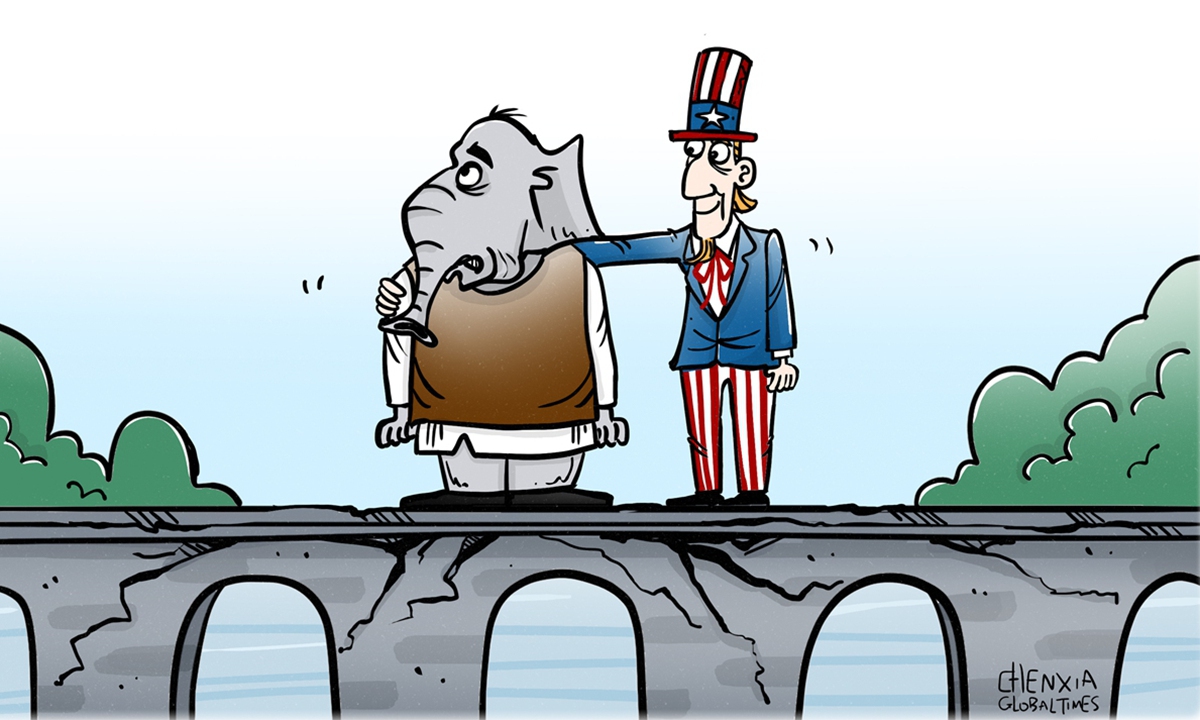
Illustration:Chen Xia/GT
In a sharp rebuke of the US' criticism of India's newly implemented Citizenship Amendment Act, which excludes Muslim migrants, Indian External Affairs Minister S Jaishankar criticized the US' understanding of India's history, according to Indian media outlets.
Jaishankar's response came after US Ambassador to India Eric Garcetti on Friday said the principle of religious freedom and equality was a cornerstone of democracy and the US can't give up on principles. Jaishankar said the act should be put in the context of the 1947 Partition and cited examples of other countries that have fast-tracked citizenship.
India must have grown tired of the US lecturing on its so-called values such as democracy and human rights. In September last year, when US President Joe Biden was in India to attend the G20 summit, he raised the issues of human rights in India and the importance of a free press with Indian Prime Minister Narendra Modi. In March last year, the annual US report on human rights practices listed significant human rights issues and abuses in India, including reported targeting of religious minorities, dissidents and journalists. In 2022, US Secretary of State Antony Blinken said the US was monitoring rights abuses in India.
The US' interference in India's internal politics and criticism of India's human rights record highlight the growing divergence in values between the two countries, hindering their strategic cooperation, said Xie Chao, an associate professor at the Institute of International Studies, Fudan University.
Democracy and human rights are a double-edged sword in the hands of the US. When it needs India, India is hailed as the largest democracy in the world. In 2022, then US deputy secretary of state Wendy Sherman, while suggesting India move away from its long-term history of non-alignment of G77 partnership with Russia, praised India's democratic position. But when India makes decisions based on its foreign policy principles and national interests that are not what the US expects, what awaits India is the US' fault-finding of India's rights record.
This shows that the so-called values are not what the US really cherishes, but a political tool with which the US manipulates its partners. India has also realized the US' hypocritical show of cordiality and is reluctant to coordinate everything with the US.
This has put the US in an embarrassing situation. On the one hand, the US still needs India on its anti-China chariot; on the other hand, it is unable to offer any real incentives that are enough to propel India to give up its positions on certain things. But if Washington lets go of New Delhi in terms of human rights issues, its much-touted rhetoric on the world stage would burst into bubbles.
Long Xingchun, a professor at the School of International Relations, Sichuan International Studies University and president of Chengdu Institute of World Affairs, told the Global Times that the human rights issue is becoming a major hurdle in the progress of US-India relations, noting that the independent path pursued by India will never be endorsed or even thwarted by the US.
Meanwhile, New Delhi may take advantage of the US' human rights criticism to keep a certain distance with the US so as to maintain its non-alignment policy. Cooperation and competition will be featured in different agendas in US-India relations. The idea of the US and India being 'natural allies' is losing realistic basis, Xie said.






